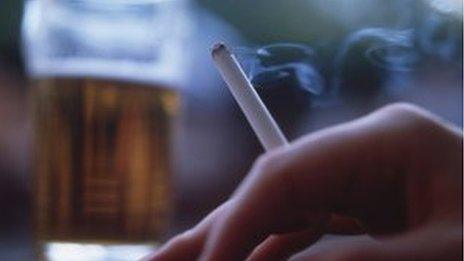How has the smoking ban impacted on health of nations?
- Published
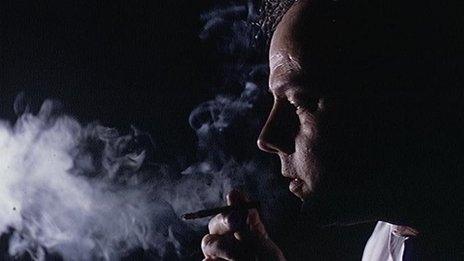
It is 10 years since smoking was banned in the workplace in Ireland
At midnight on 29 March 2004, the Republic of Ireland became the first country in the world to ban smoking in the workplace.
It was one of the first moves in a global trend.
The Irish health minister at the time, Micheál Martin, remembers a conversation with his counterpart from New Zealand.
She told him that if the pub-loving Irish could bring in a smoking ban, then the rest of the world could do it too.
That is what happened. In the ten years since, many other countries have brought in smoke-free laws.
But the strength of the restrictions varies - and there are some places where it has not happened.
So, a decade on, what has been the impact of this type of law on the health of the nations?
With the aim of answering that question, former BBC Ireland correspondent Denis Murray and I packed our bags for a journey across Europe, to make Clearing the Air for BBC Radio Four.
'Time warp'
We began in the Czech Republic, which has some of the most liberal smoking laws in the EU - bars and restaurants are free to permit their customers to have a puff inside.
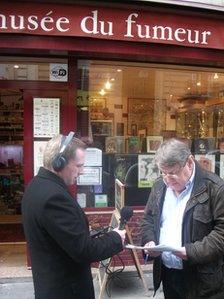
Musée de Fumeurs is a Paris museum dedicated to the history of smoking
Football night in a Prague bar felt like a time warp - a blue fog hung in the atmosphere.
By the end of the night, our hair and clothes smelled of smoke.
We found that in the Czech Republic - which went through Nazi and Communist oppression in the 20th Century - people were very suspicious of anything that restricted freedom.
Vratislav Brabanec is a musician who has a revolutionary past. He plays the saxophone for the Plastic People of the Universe - a band whose arrest became a cause célèbre for anti-communist protesters.
A keen smoker, he was disdainful of the smoke-free laws in the likes of the UK and Ireland.
"In the next generation, everything will be prohibited," he claimed. "Laughing, drinking, smoking - it will all be banned."
But Dr Eva Kralikova, who runs a smoking cessation clinic, said she longed for a ban on smoking in the workplace.
She argued that if the Czech Republic brought in a law like Ireland's, it would result in 5,500 fewer heart attacks a year.
So how has the ban gone down in France - a country which is hard to associate with non-smoking?
The land of Gauloises and Gitanes has had a ban on lighting up in bars and restaurants since 2007.
We absolutely had to pay a visit to the Musée de Fumeurs in Paris.
There, the owner Raphael Freund told us that he actually thought tobacco was not something to be consumed every day.
But he was sceptical about the ban - he said it had not helped people to give up.
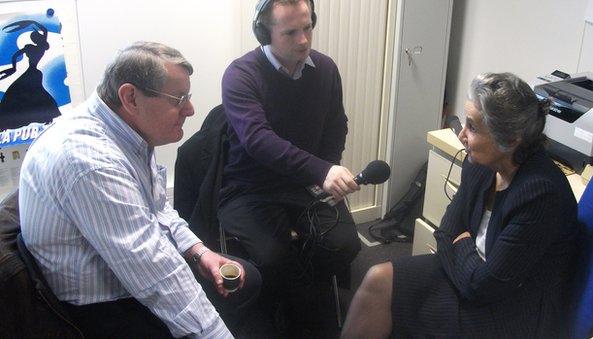
Dr Catherine Hill told us smoking was an epidemic
However, Dr Catherine Hill, an epidemiologist at France's largest cancer hospital, believed the case against tobacco was unanswerable - and governments should do whatever they could to tackle smoking.
But she said the proportion of people who smoked had not reduced since the ban had come in.
And she was worried about the levels of smoking among women in particular.
"We're just at the beginning of the epidemic," she said.
In Dublin, Mr Martin, who brought in the Irish ban, was emphatic that it had had a beneficial effect.
"The biggest difference of all is simply the quality of life people now enjoy at public meetings, going into hotels, having their meals," Mr Martin, the current leader of the Irish opposition, said.
Ireland is one of several countries now proclaiming a goal of a tobacco-free future - and Mr Martin thought that, eventually, a tobacco-free world could be a reality.
Dr Hill agreed that it was eventually inevitable because, she said, smoking was "just insane" - a habit that was killing millions of people.
But the tobacco industry was optimistic.
Axel Gietz from Imperial Tobacco - the fourth largest such firm in the world - told us he was bullish about the prospects for companies like his.
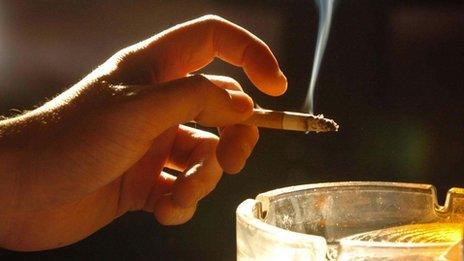
The land of Gauloises and Gitanes has had a ban on lighting up in bars and restaurants since 2007
"Evidence from around the world shows that ever stricter regulation has not prevented a hardcore of adults - let's say 20% - from choosing to smoke. Ambitious goals for a smoke-free society do not take this simple fact of life into account."
Whatever the future of tobacco, it is clear that the Irish smoking ban had a profound effect on the relationship between the cigarette and society.
This year, Russia will extend its smoking ban to all bars and restaurants and China plans to outlaw lighting up in public.
They are two of the world's most populous countries - and also have some of the highest smoking rates.
Around the world, governments are still following Ireland's lead in clearing the air.
But even ardent health campaigners do not think tobacco is going up in smoke any time soon.
Clearing the Air will be broadcast on BBC Radio 4 on Monday 31 March 2014 at 20:00 BST and will be available on BBC IPlayer.
- Published24 March 2014
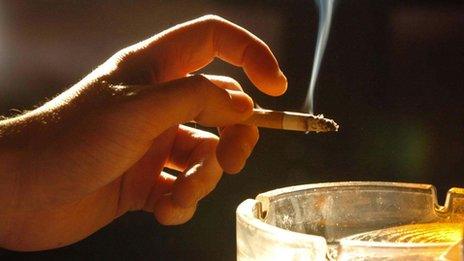
- Published3 October 2013

- Published24 April 2012
